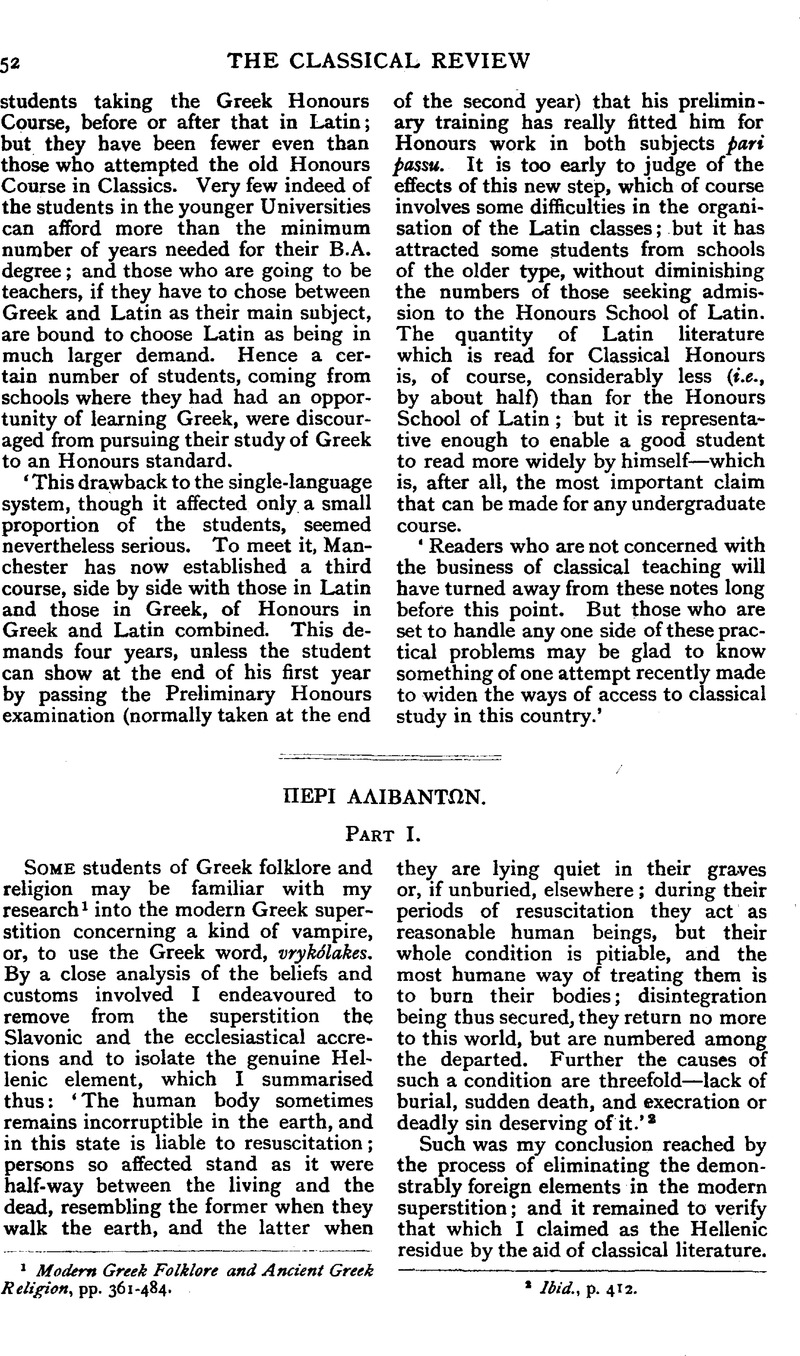No CrossRef data available.
Article contents
Abstract

- Type
- Review Articles
- Information
- Copyright
- Copyright © The Classical Association 1926
References
page 52 note 1 Modern Greek Folklore and Ancient Greek Religion, pp. 361–484.Google Scholar
page 52 note 2 Ibid., p.412.
page 53 note 1 Mirabilia, cap. I.
page 53 note 2 Rhein. Mus., Vol. XXXII., p. 329Google Scholar. For this reference and the correction of my error I am indebted to Collison Morley, Greek and Roman Ghost Stories, p. 66.Google Scholar
page 53 note 3 For the association of these two words see Tertullian, de Anima, 57; and cf. many passages cited by Rohde, Psyche, p. 373, note I.
page 53 note 4 Op. cit. 56 ad fin.
page 53 note 5 See Rohde in Rhein. Mus., loc. cit.
page 53 note 6 Modern Greek Folklore, etc., pp. 417–427.Google Scholar
page 53 note 7 Ibid., p. 427.
page 54 note 1 Modern Greek Folklore, etc., p. 462.Google Scholar
page 54 note 2 Ibid., pp. 462–484.
page 54 note 3 Ibid., p. 381.
page 54 note 4 E.g. by Galen, de temperamentis, I., cap. 3 ad fin., ![]() Cf. Etym. Magn., s.v., αλ⋯βας Hesych., s.v., ⋯λ⋯βαμτες Eustath. in Horn. 1559, 44, and 1679, 29 ff., etc. The derivation has often been rejected on the ground that the initial a in ⋯λίβας is long. This assertion depend (I) on a line attributed by Etym. Magn., s.v. ⋯λίβας, to Callimachus,
Cf. Etym. Magn., s.v., αλ⋯βας Hesych., s.v., ⋯λ⋯βαμτες Eustath. in Horn. 1559, 44, and 1679, 29 ff., etc. The derivation has often been rejected on the ground that the initial a in ⋯λίβας is long. This assertion depend (I) on a line attributed by Etym. Magn., s.v. ⋯λίβας, to Callimachus, ![]() βμαμ οίομ ⋯λ༁βαμτα πཷμομτες, which has been conjecturally restored as
βμαμ οίομ ⋯λ༁βαμτα πཷμομτες, which has been conjecturally restored as ![]() βμαμ οཷομ ⋯λༀβαμτα (i.e.οཷ ἀλཷβαμτα) πཷμομτες; cf. Hipponax, fir. 102 in Bergk, Lyrici Graeci, and Adam on Plato, Rep. 387c ; and (2) on a purely conjectural restoration of a fragment of Sophocles, which may not even have been in iambic metre; see Pearson, Sophocles (Fragments), fr. 790. In the first of these passages ⋯λཷβας means ‘vinegar,’ in the second it is the name of a river in Hades.
βμαμ οཷομ ⋯λༀβαμτα (i.e.οཷ ἀλཷβαμτα) πཷμομτες; cf. Hipponax, fir. 102 in Bergk, Lyrici Graeci, and Adam on Plato, Rep. 387c ; and (2) on a purely conjectural restoration of a fragment of Sophocles, which may not even have been in iambic metre; see Pearson, Sophocles (Fragments), fr. 790. In the first of these passages ⋯λཷβας means ‘vinegar,’ in the second it is the name of a river in Hades.
page 54 note 5 E.g. Plutarch, Quaest. Symp. VIII. 10 ad fin. (736 A); Galen, l.e.; Eustathius, ll.cc.; Etym. Magn. l.c.; Hesychius, I.c.; Suidas, s.v. Κ⋯ρ.
page 54 note 6 Plato, Rep. 387 C.
page 55 note 1 '⋯λཷβας. ⋯ μεκρ⋯ς, παρ⋯ τ⋯ μῊ ἔχειμ ὐγρ⋯τηtau;α.
page 55 note 2 Stephanus, s.v. Ἀλ⋯βας … Aliter autem Etym. ⋯λ⋯βας dici ait τοὐς ⋯μ θαλ⋯σσ⋯ τελεμτῄσαμτας : ap. querm etiam nota paroxytoneως Scribi ⋯λιβ⋯σαμτας, quasi εἰς ἄλα β⋯μτας. In the Venice edition of the Etym. Magn. 1549, the breathing on the first vowel is omitted, as if to facilitate further the derivation. Eustathius (1559, 50) would seem to have observed the misaccentuation of ⋯λιβ⋯μτας in the Etym. Magn., for he notes somewhat irrelevantly (ad Od. 6. 201) that the accent of ⋯λ⋯βας is thrown back on the analogy of the word ⋯λ⋯κρας, though elsewhere he does not accept the derivation which this analogy implies.
page 56 note 1 Op. cit., pp. 432–433.
page 56 note 2 Acts xvii. 31, 32.
page 56 note 3 Aristoph. Frogs; 194 ff.
page 56 note 4 Schol. ad Aristoph. Ranas 186, ⋯π⋯ τοὐ τοὺςμεκροὐς αὐα⋯μεσθαι κλ⋯βαμτας εἱμαι, repeated in similar words in the scholium on 194 (i.e. ξηρο⋯ς εἰμαι instead of αὐα⋯μεσθαι).
page 56 note 5 Aesch. Eum. 330 and 345.
page 57 note 1 Aesch. Eum. 267.
page 57 note 2 Ibid. 137–139.
page 57 note 3 Herod. III. 24.
page 57 note 4 Ibid. 267.
page 57 note 5 Mod. Gk. Folklore, etc., pp. 440 ff.Google Scholar, with special reference to Aesch. Choeph. 924–925, and Eurip. Or. 580 ff. Aesch. Choeph. 287–288.
page 57 note 6 Herod. II. 86 ff.
page 57 note 7 Mod. Gk. Folklore, etc., pp. 421 ff.Google Scholar
page 57 note 8 Aesch, . Choeph. 280–281.Google Scholar


